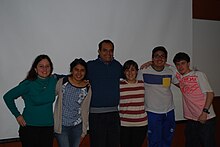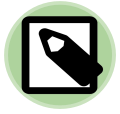Education/Newsletter/September 2014/Single
|
WMF • Sweden • Czech Republic • Mexico • Germany • Articles of interest: Philippines, Argentina, Brazil, and more |
By Floor Koudijs, Senior Manager, Wikipedia Education Program, Wikimedia Foundation
The Wikipedia Education Collaborative (Collab) welcomes five new members this month, who will continue working on expanding resources for and providing mentorship to other Wikipedia Education Programs worldwide. We are happy to include program leaders representing for Egypt and Uruguay, replacement members for Serbia and Catalonia, and a co-representative for Armenia.
Samir el-Sharbaty will be the representative for Egypt. After being an ambassador for the Wikipedia Education Program for the Arab world he has stepped up to be the volunteer leader for the Egypt program for the past two terms. He is an active Wikimedian, a sysop/admin on Arabic Wikipedia, and one of the co-founders of the recent Egyptian user group.
Fernando da Rosa Morena will be representing Uruguay. He is a professor at the Universidad de la República, a public university in Uruguay, and he uses Wikipedia in the classroom in his own classes. He is the director of Wikimedia Uruguay, and the author of UNESCO's guide to free and open software in Spanish. He is working with two government agencies (CEIBAL and CFE) and has implemented a program where future teacher trainers are trained in Wikipedia editing.
Filip Maljković will be Serbia's new representative, taking the place of Ivan Matejić. Filip joined the Wikimedia movement in 2004, when he was only 17 years old! He is a sysop and a bureaucrat. He was one of the founding members of Wikimedia Serbia, he is the board president for Wikimedia Serbia, and he has been active in WMRS's Academic Board.
Mariona Aragay is representing Catalonia and taking the place of Alex Hinojo. She is a Wikipedian-in-Residence at the Museu de la Música de Barcelona. There she launched this WikiProject, and she is currently working on collaborative projects between universities and Wikipedia. She joined our movement in 2011 as part of a Wiki Loves Monuments contest.
David Saroyan will be representing Armenia together with Lilit Tarkhanyan. David has been involved with Armenia's education program and the chapter since 2013, and he has been involved in our movement since 2009. He's working on his PhD at the Institute of Molecular Biology National Academy of Sciences of Armenia.
With these new members joining the Collab, together we will keep working together toward our vision, which is that Wikipedia belongs in education!
By Sara Mörtsell (Wikimedia Sweden)
Wikimedia Sweden was invited to take part in a workshop arranged by The Stockholm County Association of Local Authorities in order to take steps towards setting a digital agenda for education policy and practice in the Stockholm County. There was great interest in how knowledge sharing and openness can benefit education in the region on all levels, from classroom to administration.
August also meant continued work on designing an open badge system for educators and students involved in the Education Program. At this early stage, the system i set up by one main badge which is composed by three sets of skills (for students) and three key tasks (for teachers). Student badges are green and teacher badges are blue and as visual representations they enhance the process of assigning students to edit Wikipedia, which is discussed in this blogpost (Swedish) and a brief English translation can be found here. These badges will be tested in coming activities for feedback from the earners on how the system can be improved.
-
Student Badge Wikipedia skills
-
Communicaton skills
-
Critical evalutation
-
Media and information Literacy
-
Badge for Educator with Wikipedia skills
-
Syllabus design
-
Topic inventory
-
Student feedback
By Vojtěch Dostál (Wikimedia Czech Republic)
"Elementary Law" became the most successful course of the Czech education program (Students Write Wikipedia) in the school year 2013/2014. More than 70 students added 394 566 bytes of information, did 953 edits and created 24 new pages while editing many others. The course was taught by Daniel Barton for his students from Charles University and the High School of Theology and Social Law. The results of the course, analyzed by Wikimetrics app, show how big the impact of a course can be, given there is effort on both sides - on the side of Wikipedia (with lots of volunteers helping students and the teacher) and on the side of students (who worked hard to write their first Wikipedia entries). The good news is that the course is about to continue in the upcoming school year with a promise of many new and improved articles on social law.
By Thelmadatter (Wiki Borregos/Wiki Learning)

Fall 2014 Wiki activities have begun at Tec de Monterrey, with a new group of students doing mandatory community service hours (servicio social) as well as new teachers exploring the possibilities that Wikimedia has to offer. Servicio social students are a group of twenty, including two students who were permitted to repeat a semester working with Wikipedia, a welcome change in servicio social policy. This group has already translated and written over forty articles for Spanish Wikipedia, as well as uploaded about 100 photographs.
Efforts to train professors over the summer have led to commitments by seven to work with the platform, mostly at the Mexico City Campus. Training of students from these classes has already begun. Teachers repeating work with Wikimedia include Laura Perez, who has students start with Wikipedia as part of a web quest. Goals for this semester include creating text and images not only for Wikipedia, but also for Wiki How and You Tube. Professor Jesús Herrera has his German IV students translating articles from German into Spanish, mostly dealing with German culture and history. This is first education project translating between these two languages. The students are MercedesFV95, Juan Escalona Santiago (translating Jan Mauersberger), Iris Lilián DB and Jemand FD (translating Scharfenberg)
Projects are in the planning stages with three English classes, one graduate course and one undergraduate course in communications, and two composition classes.
Three primary schools which already with the the Mexico City campus in the Mati Tec program [1] have agreed to expand efforts into working with Wikipedia, in a project called "Wiki Mati." Inspired by the documentary "The Web" by Michael Kleiman [2], children at these schools will be documenting the neighborhoods (colonia) where their schools are located. This documentation will be done in text, photographs and even sound recordings, using Spanish Wikipedia, Wikimedia Commons and the schools' own official blogs (for first-person information such as interviews). The pilot is set to select 10 students from each school, being chosen through a contest where they use their Mati Tec cell phones to photograph the local neighborhood. The aim here is to find the most motivated students for the project. Sessions to train teachers at the schools as well as Mati Tec volunteers in working with Wikipedia have already been scheduled for the coming week.
By Christopher Schwarzkopf (Wikimedia Deutschland)
The last weeks we at Wikimedia Deutschland spent a lot of time preparing and executing different events focussing on educational topics. A more detailed report about the respective events will follow in next months issue of the newsletter (including pictures and video footage) but here is already a brief summany of what we did:
- Event on open science in Vienna (15 September): On 15 September an international event took place onboard the exhibition ship MS Science in Vienna. The event covered various topics such as open science, open data and citizen science and was organized by Wikimedia Deutschland, Wikimedia CH and Wikimedia Österreich as well as the Open Knowledge Foundation in Germany and Austria. It was funded by the Austrian Science Fund (FWF). Together with scientists, politicians, experts and the general public we discussed different aspects of openness and free knowledge in science.
- Open educational resources conference 2014 (12 & 13 September): On 12 and 13 September the largest event by Wikimedia Deutschland in 2014 took place in Berlin: The Open Educational Resources Conference 2014 (OERde14). About 400 people with backgrounds in education, science, politics, media and publishing attended the conference and its numerous talks and presentations. We were very happy to welcome a number of international guests such as Dirk van Damme (Head of the Innovation and Measuring Progress Division at OECD) and Nicole Allen (Director of Open Education for SPARC, USA) who were the keynote speakers at the conference. The goals of the conference were to bring together activists, educators and representatives of the political level and to discuss the future of OER in Germany. Our evaluation is not finished yet but we are so far very happy with the turnout, the mix of people and the feedback given to us. More information on this will follow next month. Also, we officially announced our open education coalition (Bündnis Freie Bildung) at the conference. The working group is an initiative of Wikimedia Deutschland, Creative Commons Deutschland and the Open Knowledge Foundation. It consists of a number of OER-experts that will develop a white paper with political recommendations for Open Educational Resources until the end of the year. The first meeting of the working group took place prior to the conference in mid-August and more meetings will follow throughout the rest of the year. One of the first publications of the group was a statement on the “digital agenda” of the German government that was announced in August and that disappointed by not mentioning Open Educational Resources as part of the digital landscape.
- Digital competencies (1 September): On 1 September we had our second event within the “Digital Competencies”-Project that we started in late June. This time the topic was the term “Digital Natives” and we had speakers from different backgrounds (science as well as media education) that discussed whether the term is used in a correct way and what it actually means. We were happy that more than 60 people attended the event. The next event will take place on 29 September and will focus on “digital safety at work”.
Global: Black-Market Learning or: How I Learned to Stop Worrying and Love Wikipedia
[edit]National Geographic looks at "the black market of learning" and gives 10 reasons why teachers should be using Wikipedia as a resource.
Global: Academic opinions of Wikipedia and open access will improve with more active involvement
[edit]An survey in 2014 shows that with more experience, most academics open up to the concept of open access publishing, including with Wikipedia.
Philippines: Smart offers free access to Wikipedia until February next year
[edit]"...Through Smart’s Tap&Learn [program], Wikipedia Philippines representatives are helping train educators from public elementary and secondary schools across the country on how to use Wikipedia to enhance the learning experience of their students, and for their own professional development...."
Argentina: Wikimedia and RELPE present a free course
[edit]Wikimedia Argentina and the Latin American Web of Educational Portals have created an online course about the principles of free culture and how it relates to education and new technologies.
Read the full article here (in Spanish).
Brazil: Wikipedia may reinvent school testing
[edit]This article in Brazilian mazagine Galileu gives an overview of Wikipedia education efforts in the country and what it means for student evaluation.







